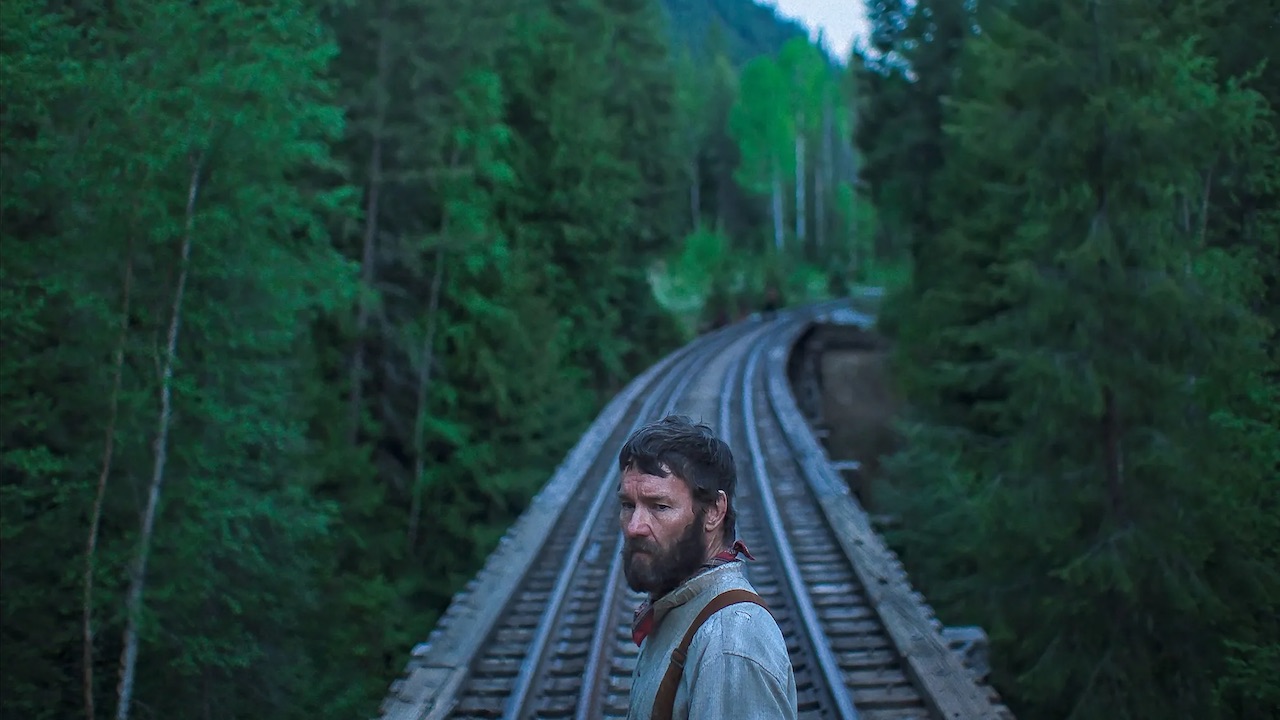There’s a moment toward the middle of Train Dreams in which an elder in a team of loggers is explaining to a young hotshot the cosmic weight of what they’re doing. “It’s rough work, gentlemen, not just on the body but on the soul. We just cut down trees that have been here for 500 years. It upsets a man’s soul whether you recognize it or not.” The younger man, unsurprisingly, is more worried about the $200 in his pocket and believes, without reservation, that they could never in a thousand years cut down all these trees, that the abundance of the land will last forever.
Meanwhile, the film’s protagonist, Robert (Joel Edgerton), sits quietly on the periphery, the light from the fire licking his stoic, bearded face in waves. He needs the money, too—his wife and young child wait patiently for his return. But even in his youth, he’s not a man who sees the world as his for the taking. For all his ambitions, he’s not a striver, not a milkshake drinker of the nascent American West. He’s simply a man who wants to carve out his own modest existence, to build a homestead, to be a master of his own fate. But fate, we come to learn in ways both harsh and touching, is very much a human concern, and this is a land not yet under the sway of human will.
If this is all sounding a bit florid, you can blame Will Patton, whose narration throughout is one of the many highlights of a film that finds the lyrical grace within every swing of an ax and moment of quiet contemplation. Written and directed by Clint Bentley, whose work on last year’s Sing Sing reveals a distinct humanist streak, Train Dreams is adapted from the 2011 novella of the same name by Denis Johnson and tracks the life of Robert Grainier, a humble logger and farmer at the birth of the 20th century. The framing is no less than the entirety of Grainier’s life, but it’s the way that Bentley shows this life—in moments rather than scenes, in swirling Malick-esque vignettes—that begins to engulf the viewer. It’s cause and effect only in as much as one section of the river characterizes the next.
It’s an approach that works due to full commitment and an incredibly thoughtful approach to every aspect of the film. From Alexandra Schaller’s production design to Adolpho Veloso’s cinematography to Bryce Dessner’s appropriately grandiose score, everything is considered. This applies to the performances, as well. That old logger espousing the meaning of the universe across a fire while he sips whiskey? None other than William H. Macy, whose face was practically designed to find the gruff realism in such heady lines. Felicity Jones and Kerry Condon, the two women we see play a role in Grainier’s life, are believably hardened even as fragility rears its head. But topping the bill in this regard is Edgerton, a woefully underrated performer whose stony jaw and soft eyes are perfectly suited to the kind of iceberg character of Johnson and Bentley’s story.
It’s only as this narrative unfolds that we begin to see just how Grainier’s story fits into something larger. Late in the film, after life has thoroughly beaten him down, Grainier is referred to as a hermit, someone who allows life to happen to him more than an agent of change. And yet, as a logger in the turn of the century, we know the great effect his profession would have on the landscape of the American Northwest, and the growth and discovery that all of human industrialism would allow. It’s understandable that when Grainier sees a news clip of an American in space, he practically runs in horror. The very world he helped change has, in the span of only a few decades, completely passed him by. His own impact becomes nearly invisible, and yet it orbits the Earth.
Bentley’s own 10,000 foot approach allows us to see Grainier’s life, defined by tragedy as it is, as some inevitable whole. This is driven home early in the film with the untimely (or, perhaps, perfectly timed) death of Macy’s character from a fallen tree branch. “Isn’t it all so beautiful,” he says in his final, brain-swelled moments—an observation, in time, that Grainier seems to embrace as well. For all the tragedy that befalls Robert throughout his life, he doesn’t seem to blame the gods or the natural world for his troubles so much as wallow in the randomness of it all. He’s not scratching and clawing against such natural foes as time and fate so much as succumbing to them.
Train Dreams is the rare film that gives even age-old ideas like this new life: that everything matters even as nothing makes sense; that the natural world is random and deadly, but never cruel; that fate’s hand pulling us toward extinction is the only certainty; and that our time, however fleeting and fickle, is all we really have.







